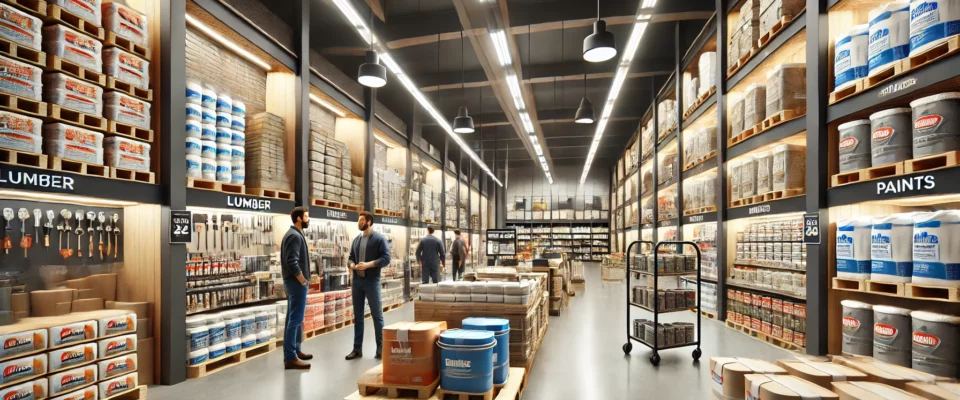The atmosphere in retail spaces plays a crucial role in influencing customer behavior and overall experience. From lighting to layout, every element contributes to creating an environment that attracts and retains customers. Among these elements, aromatherapy has emerged as a powerful tool to enhance the in-store experience. By using pleasant fragrances, building materials stores can create a welcoming and enjoyable environment that makes customers feel comfortable and encourages them to spend more time in the store.
The Psychology of Scents: Impact on Customer Behavior
Aromas have a profound effect on human emotions and behavior, tapping into the psychological associations we make with different scents. The use of aromatherapy in retail settings is designed to evoke positive feelings and create a sense of comfort, which can significantly impact how customers perceive a store. When customers enter a store and are greeted by a pleasant aroma, it immediately sets a positive tone for their shopping experience. This can make them feel more relaxed, increasing the likelihood of making a purchase.
The right perfume can also trigger specific emotions that align with the shopping experience a store wants to provide. For example, a subtle woody scent can evoke feelings of stability and reliability—perfect for a building materials store, where customers are looking for products that are strong and dependable. On the other hand, a fresh citrus scent can bring about a sense of cleanliness and energy, making customers feel more motivated and enthusiastic while browsing the aisles.
In addition to creating a comfortable atmosphere, certain aromas can stimulate customer loyalty and make a store more memorable. When customers associate a particular scent with a positive shopping experience, they are more likely to return. This phenomenon, known as scent branding, helps to build a deeper emotional connection between customers and the store. By consistently using a signature scent, building materials stores can establish a distinct identity that customers remember long after they leave.
Research has also shown that pleasant aromas can increase dwell time—the amount of time customers spend in a store. The longer customers stay, the more likely they are to explore products and make purchases. By using carefully chosen scents, stores can subtly influence customer behavior, encouraging them to spend more time discovering the full range of products available.
Selecting Scents for Building Materials Stores
Choosing the right aromas for a building materials store is crucial to creating the desired atmosphere. Unlike a boutique or a grocery store, building materials stores need to balance the utilitarian aspect of their products with a welcoming environment. This means selecting fragrances that are neither too overpowering nor too subtle, and that can enhance the shopping experience without distracting from the products on display.
For stores with a focus on wood and timber products, woody scents such as cedar or sandalwood can create a harmonious environment. These scents naturally complement the earthy nature of the products, reinforcing the idea of durability and quality. The subtle use of woody aromas can also evoke a sense of nostalgia, reminding customers of nature and craftsmanship, which can be particularly appealing when they are shopping for high-quality building materials.
For areas that feature paints and coatings, a fresh and clean scent can help counterbalance any chemical odors that might be present. Citrus-based aromas, such as lemon or bergamot, are ideal for these sections, as they create a sense of cleanliness and freshness. This not only helps mask any unpleasant smells but also makes customers feel more comfortable spending time in these areas of the store.
In sections dedicated to tools and hardware, energizing scents like peppermint or eucalyptus can help create an atmosphere of activity and focus. These scents can invigorate customers, making them feel more alert and engaged while browsing tools and equipment. It’s also important to ensure that the fragrances used in these sections are not overwhelming, as a subtle touch is often more effective in maintaining a pleasant shopping experience.
Scenting Technology: Creating the Perfect Atmosphere
To create an ideal aromatic environment, it is important to invest in the right scenting technology. Modern scent diffusion systems have come a long way from traditional air fresheners. Today, advanced HVAC scenting systems can deliver consistent and even scent distribution throughout large retail spaces, ensuring that the fragrance is subtle and not overpowering. These systems can be easily integrated into the store’s existing ventilation, allowing for seamless diffusion.
- Another popular option is stand-alone scent diffusers, which can be strategically placed in key areas of the store. These diffusers are ideal for creating targeted aromatic experiences in specific sections, such as the paint or timber aisles. They allow for greater flexibility, enabling stores to use different scents in different areas to match the nature of the products being displayed.
- When selecting a scenting system, it is important to consider the size of the store and the desired intensity of the aroma. Large stores may require multiple diffusers to ensure even coverage, while smaller areas may benefit from a more localized approach. It’s also important to choose a system that allows for adjustable settings, so that the intensity of the fragrance can be modified based on customer feedback or seasonal changes.
- Regular maintenance of scenting equipment is also key to ensuring that the aromas remain pleasant and effective. Filters should be cleaned, and fragrances should be refreshed regularly to avoid any unpleasant buildup or fading of the scent. By investing in high-quality scenting technology and maintaining it properly, building materials stores can create a consistently pleasant environment that enhances the customer experience.
Aromas and Brand Identity: Strengthening Company Image
A unique aroma can become an integral part of a store’s brand identity, helping to strengthen the connection between customers and the brand. Just as a logo or color scheme is part of a company’s visual identity, a signature scent can become a recognizable element of a brand’s sensory experience. By creating a consistent aromatic environment, building materials stores can distinguish themselves from competitors and create a lasting impression.
The concept of scent branding involves using a specific fragrance that reflects the brand’s values and personality. For example, a building materials store that prides itself on sustainability and eco-friendliness might choose a natural, earthy scent to convey these values. This helps to reinforce the brand’s message and creates a sensory experience that aligns with the store’s mission. Customers will come to associate the pleasant aroma with the store’s commitment to quality and sustainability.
Several successful brands have already embraced scent branding as part of their strategy. For instance, some high-end retail stores use luxurious floral scents to create an atmosphere of sophistication and exclusivity, making customers feel special as they shop. By applying this concept to a building materials store, it is possible to create a unique and memorable atmosphere that resonates with the target audience and enhances brand loyalty.
A consistent and well-chosen aroma can also lead to increased customer loyalty. When customers have a positive experience and associate it with a particular scent, they are more likely to return to the store. This emotional connection, fostered through scent, helps to build a loyal customer base.
Also, we advise you to read our other article, where we talked about how to choose a reliable supplier.
FAQ
Aromas can evoke positive emotions, create a comfortable atmosphere, and increase dwell time, all of which can encourage customers to spend more time in the store and make purchases.
Woody scents are ideal for timber sections, citrus scents work well in paint areas, and energizing scents like peppermint are great for tool sections. Neutral scents like vanilla can be used throughout the store for a welcoming atmosphere.
A signature scent becomes part of the brand’s identity, creating a sensory experience that customers associate with the store. This helps in building emotional connections and encouraging customer loyalty

